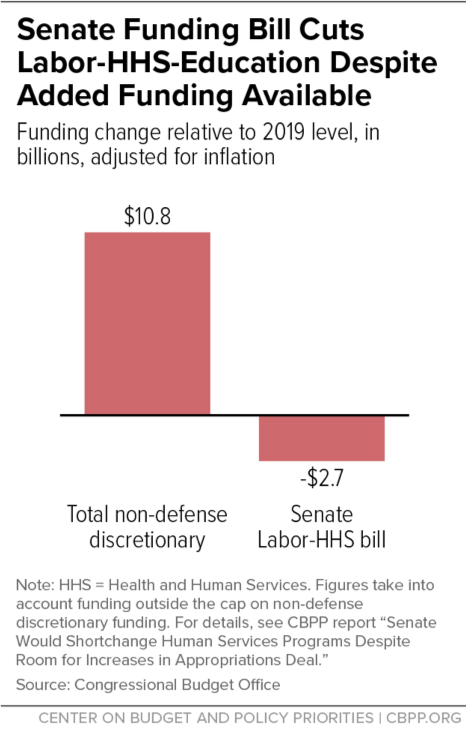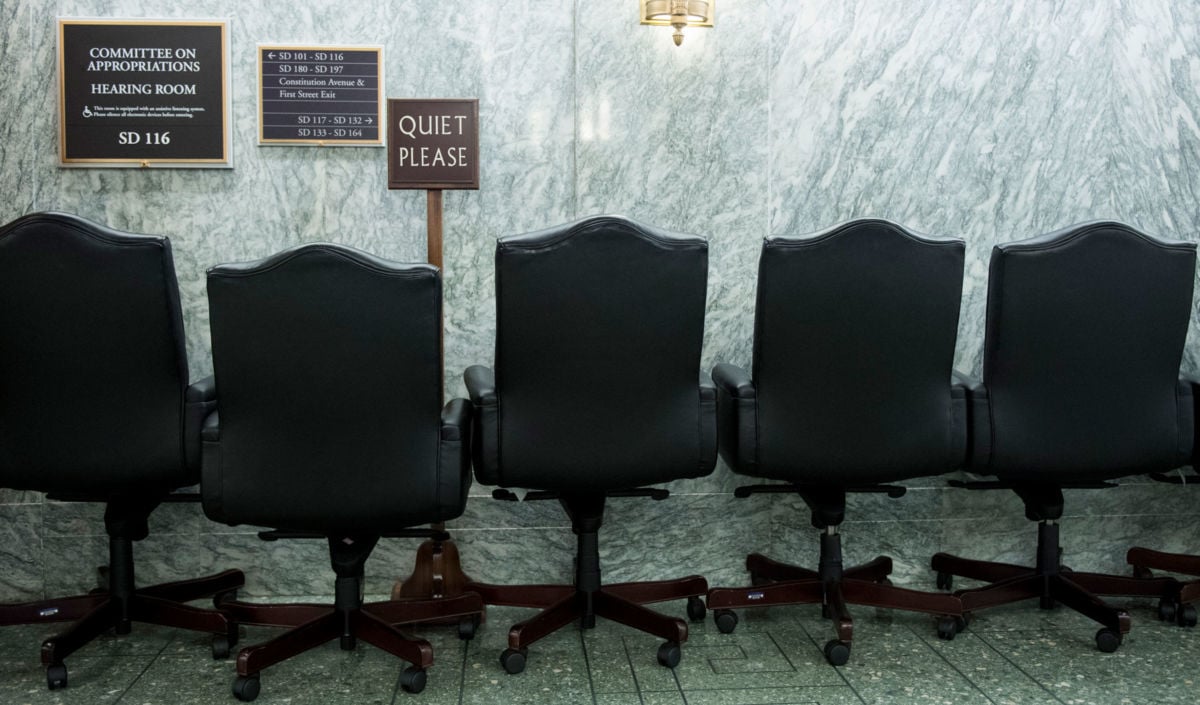The Senate Appropriations Committee proposes to cut 2020 funding for the departments of Labor, Health and Human Services (HHS), and Education by $2.7 billion below the 2019 level in inflation-adjusted terms, even though the President and Congress agreed this summer to increase overall non-defense discretionary (NDD) funding for 2020.
Moreover, the bill increases funding for the National Institutes of Health (NIH), so other priorities that the bill funds — including helping families afford child care and improve their children’s opportunities, strengthening workers’ skills, improving health and education, and administering Social Security — face a cut of nearly $4.3 billion after adjusting for inflation, which would worsen shortfalls in some areas that already face serious funding gaps. The House, which provided a larger share of its overall increased funding for NDD for 2020 to Labor-HHS-Education programs, offers a far better approach.
The Bipartisan Budget Act of 2019 lifted the NDD funding caps for 2020 and 2021, setting the 2020 cap $24.5 billion above the 2019 enacted level in nominal dollars. It also allowed for some NDD funding outside the caps (such as for war costs and wildfire suppression), bringing the total 2020 increase to $26.3 billion. After adjusting for inflation, the NDD funding available in 2020 is $10.8 billion above the 2019 level. But, as noted, the Senate Labor-HHS-Education bill would be cut by $2.7 billion below the inflation-adjusted 2019 level. (See graph.)

-
Child care and Head Start. The bill ignores the need for substantial additional investments in early learning, reducing the Child Care and Development Block Grant (CCDBG) and Head Start by nearly 2 percent ($104 million for CCDBG and $196 million for Head Start) relative to the 2019 level in inflation-adjusted terms.
Child care should be an investment priority, especially because current funding falls well short of need. Only about 1 in 6 children who qualified for child care assistance under federal eligibility rules in 2015 received it due to funding shortfalls, and in 2017 the program assisted 450,000 fewer children than in 2006.
Similarly, without new resources, Head Start can’t keep pace with rising costs, let alone improve high-quality learning for infants and toddlers by expanding Early Head Start, expanding partnerships between Head Start and child care programs, or serving more children in full school-day and full school-year programs. While Head Start served about 887,000 low-income infants, toddlers, and preschoolers in 2017, this included only about 31 percent of eligible preschoolers and 7 percent of eligible infants and toddlers.
- Family planning. The bill would cut funding for Title X family planning by over 2 percent, after adjusting for inflation. Coming on top of many previous years of cuts, it would leave Title X funding 25 percent below the 2010 level, after adjusting for inflation. Also, whereas the House-passed Labor-HHS-Education appropriations bill would block the Trump Administration from implementing its February 2019 regulations excluding many qualified safety net family planning clinics from Title X, the Senate bill doesn’t address the issue. These regulations likely would significantly reduce access to essential family planning and other health care services for low-income women and men.
- K-12 education. The bill would cut funding for one of the largest federal sources of K-12 funding — Title I for disadvantaged students — by $388 million or more than 2 percent after adjusting for inflation. Education funding for students with disabilities under the Individuals with Disabilities Education Act would also face a cut in inflation-adjusted terms.
- Job training. The bill would continue the trend of underinvesting in job training by reducing funding for Workforce Innovation and Opportunity Act job training grants for states and localities by over 2 percent, after adjusting for inflation. The total cut since 2010 would grow to 22 percent in inflation-adjusted terms.
- Social Security Administration (SSA). The bill would cut SSA’s operating budget by $270 million or more than 2 percent, after adjusting for inflation. SSA’s operating budget fell by nearly 11 percent between 2010 and 2019 in inflation-adjusted terms, even as the number of beneficiaries grew by 17 percent. This disinvestment has forced the agency to close field offices, shorten office hours, and shrink its staff, undermining customer service as costs and workloads grow.
The House took a different approach in its Labor-HHS-Education bill. While its 2020 appropriations bills assumed higher overall NDD funding than the bipartisan budget agreement ultimately allowed, the House gave the Labor-HHS-Education bill slightly more than its proportional share of the NDD funding increase for 2020. As we’ve explained, the House bill includes sensible, well-targeted investments in important areas such as early education, job training, K-12 education, Social Security operations, and family planning.
Help us Prepare for Trump’s Day One
Trump is busy getting ready for Day One of his presidency – but so is Truthout.
Trump has made it no secret that he is planning a demolition-style attack on both specific communities and democracy as a whole, beginning on his first day in office. With over 25 executive orders and directives queued up for January 20, he’s promised to “launch the largest deportation program in American history,” roll back anti-discrimination protections for transgender students, and implement a “drill, drill, drill” approach to ramp up oil and gas extraction.
Organizations like Truthout are also being threatened by legislation like HR 9495, the “nonprofit killer bill” that would allow the Treasury Secretary to declare any nonprofit a “terrorist-supporting organization” and strip its tax-exempt status without due process. Progressive media like Truthout that has courageously focused on reporting on Israel’s genocide in Gaza are in the bill’s crosshairs.
As journalists, we have a responsibility to look at hard realities and communicate them to you. We hope that you, like us, can use this information to prepare for what’s to come.
And if you feel uncertain about what to do in the face of a second Trump administration, we invite you to be an indispensable part of Truthout’s preparations.
In addition to covering the widespread onslaught of draconian policy, we’re shoring up our resources for what might come next for progressive media: bad-faith lawsuits from far-right ghouls, legislation that seeks to strip us of our ability to receive tax-deductible donations, and further throttling of our reach on social media platforms owned by Trump’s sycophants.
We’re preparing right now for Trump’s Day One: building a brave coalition of movement media; reaching out to the activists, academics, and thinkers we trust to shine a light on the inner workings of authoritarianism; and planning to use journalism as a tool to equip movements to protect the people, lands, and principles most vulnerable to Trump’s destruction.
We’re asking all of our readers to start a monthly donation or make a one-time donation – as a commitment to stand with us on day one of Trump’s presidency, and every day after that, as we produce journalism that combats authoritarianism, censorship, injustice, and misinformation. You’re an essential part of our future – please join the movement by making a tax-deductible donation today.
If you have the means to make a substantial gift, please dig deep during this critical time!
With gratitude and resolve,
Maya, Negin, Saima, and Ziggy
